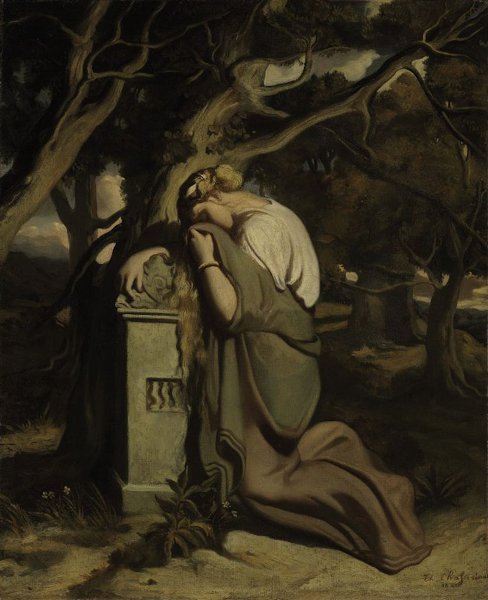By explicitly associating Mozart’s portrait with his printed music, and the manuscript of K20 with a ‘sounding’ piece of music – the British Museum’s description of the sonatas and manuscript as ‘musical performances’ is significant in this respect – Leopold Mozart effectively makes both the physical objects, the music print and autograph, and the immaterial object itself, the music, souvenirs. To understand fully this notion in an eighteenth-century context, it is necessary to consider the meanings of the word 'souvenir' at the time.

Théodore Chassériau, Jeune fille pleurant sur une stèle ou Le Souvenir, 1840 (Montreal, Musée des Beaux-Arts)
During the eighteenth century, and well into the nineteenth, the word souvenir – now generally understood as 'something that is given or kept as a reminder of a place, person, event, etc.; a memento, a keepsake; spec. a (typically small and inexpensive) item designed for sale to tourists and having some association with the place visited’ (OED) —did not refer solely to a material object. To be sure, material objects were sometimes described with the word souvenir or were produced with the same intent as the modern meaning of the word: the model of the Church of the Holy Sepulchre that the Mozarts saw at the British Museum, for example, was originally produced as a souvenir for visitors to the Holy Land. But the simple materialness of the objects was not their essential attribute. Rather it was their evocation of the Enlightenment pursuit of knowledge – manifested in part in the founding of major museums, including the British Museum and the Istituto delle Scienze in Bologna, both of which the Mozarts visited – and, significantly in terms of the word souvenir itself, their evocation of memory and feelings. In this respect, the predominant meaning of souvenir derives from the French souvenir[1] as defined by Diderot and D’Alembert in the Encyclopédie, even when it was used in English and German texts of the time.
[1] See OED: Etymology: < French souvenir act of remembering, a memory (end of the 13th cent. in Old French), something that serves as a reminder, memento (1676), narration or account of memories (a1729 as a work title), use as noun of souvenir to have (something) in one's memory (c1100 in Old French as suvenir ), to recall (c1130–40), to commit to memory (1176–81), to remind (someone of something) (c1265)